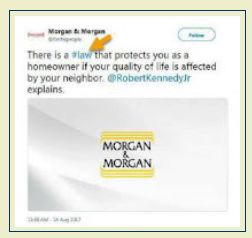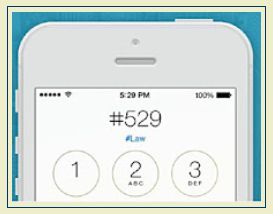The Board upheld a refusal to register the proposed mark #LAW for legal referral services, finding that the term, as used on Applicant Pound Law's specimens of use, fails to function as a source indicator. Instead, the Board found that the term, a vanity phone number, would be perceived by consumers as merely informational, a means to contact the applicant or its licensee, the Morgan & Morgan law firm. In re Pound Law, LLC, 2022 USPQ2d 1062 (TTAB 2022) [precedential] (Opinion by Judge Cynthia C. Lynch).

The Board observed that, as made clear by the Trademark Act, the USPTO "is statutorily constrained to register matter on the Principal Register if and only if it functions as a mark." In re Brunetti, 2022 USPQ3d 764, at *9. Section 45 defines "trademark" and "service mark" as "any word, name, symbol, or device, or any combination thereof ... used by a person ... to identify and distinguish" goods or services, respectively, "and to indicate the source" of the goods or services, "even if that source is unknown." The Board must determine "whether the relevant public, i.e. purchasers or potential purchasers of the identified legal and legal referral services, would perceive #LAW as identifying the source or origin of such services." See, e.g., In re Texas With Love, LLC, 2020 USPQ2d 11290, at *2 (TTAB 2020).
Considering first the nature of the proposed mark, the Board pointed out that "matter widely used to convey informational messages generally is not perceived as indicating a single source." See, for example, Vox Populi Registry, 2022 USPQ2d 115, at *3 (affirming failure-to-function refusal where .SUCKS would be viewed "as only a non-source identifying part of a domain name, rather than as a mark"). The CAFC in Vox Populi indicated that evidence of how a term is used in the marketplace is relevant to the issue of consumer perception.
Citing numerous examples from various law firm advertising materials, the Board found that #LAW is commonly used as a hashtag in the legal field, including by the applicant's licensee, Morgan & Morgan. Although the third-party uses are not in the nature of trademarks, they are probative of consumer perception. "Applicant's use of its proposed mark is not qualitatively different than the third-party uses that Applicant concedes are not source indicating."
Applicant Pound argued that the Board has long recognized the registrability of mnemonic telephone numbers, pointing to TMEP Section 1209.02(l). [Reminder: the TMEP is not the law - ed.]. The Board, however, pointed out that the new versions of vanity phone numbers "present a somewhat different situation that traditional alphanumeric numbers." The different "formation" of these new vanity numbers "impacts perception and distinguishes them" from traditional numbers.
Turning to the applicant's own use of #LAW, its specimens of use fell into two categories: multimedia examples promoting the Morgan & Morgan law firm, and website excerpts promoting the #LAW vanity phone number to the general public and to law firms. As to the former, the Board concluded that they do not show service mark use because "they present #LAW as a mnemonic for the telephone number #529, by which prospective clients may contact a lawyer at Morgan & Morgan law firm, not as a source indicator for legal or legal referral services."
As to applicant's website specimens (which do not refer to Morgan & Morgan), the Board found that, when each is viewed as a whole, consumers would view #LAW as a mnemonic for a phone number and not a source indicator. For example, the appearance of #LAW under #529 on a cellphone screen conveys that "this is the phone number to use to be connected with a lawyer who is part of of the 'nationwide network of law firms.'"

Applicant Pound maintained that the Board disregarded the CAFC's Dial-A-Mattress decision, which Pound claimed "expressly recognize[s]that mnemonic telephone numbers function as trademarks." The Board disagreed. "Just as there is no per se rule that all mnemonic telephone numbers are not registrable, there is no per se rule that they are. As in all refusals, consumer perception is determined based on the unique evidence and circumstances in each case."
Dial-A-Mattress involved the reversal of a genericness refusal of 1-800-MATTRESS, deeming the mark descriptive but having acquired distinctiveness. Here, the refusal is based on "failure-to-function in view of the manner of use by Applicant on its specimens." Thus, there is no inconsistency between this case and Dial-A-Mattress.
Finally, Pound pointed to its ownership of a 15-year old
registration for #LAW on the Supplemental Register. The Board was
unimpressed, observing that it must make its own findings of fact
regardless of the conclusions made by an examining attorney in
another application, and recognizing that circumstances have
changed in the 15 years since the prior registration issued
(including third-party use of the proposed mark as a hashtag).
"Given the nature of Applicant's use on the specimens at
issue, the prior registration does not convince us that #LAW
functions as a service mark in the case before us."
The Board therefore affirmed the refusal to register under Section 1, 2, 3, and 45 of the Trademark Act.
The content of this article is intended to provide a general guide to the subject matter. Specialist advice should be sought about your specific circumstances.

